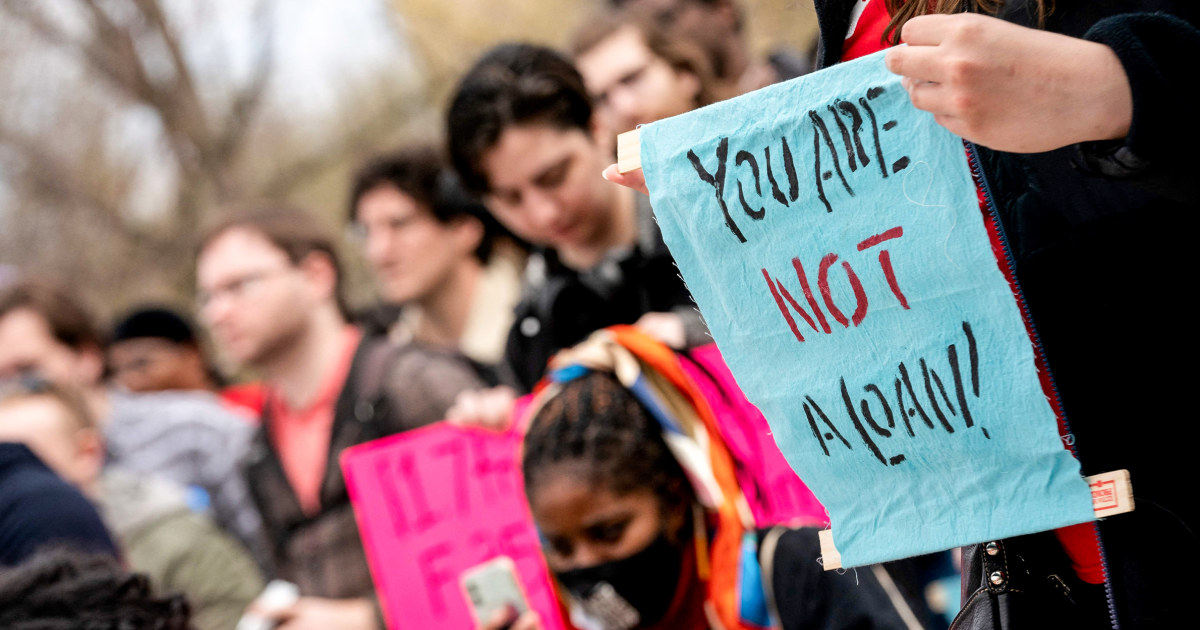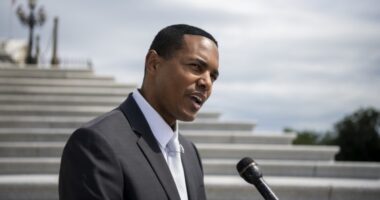
When news broke Tuesday that the Biden administration was going to relax the rules of certain student loan repayment plans, thereby forgiving federal loans for 40,000 borrowers and offering 3.6 million people credit toward paying off their balances, I thought of my close friends and students who’ve been knee-deep in education-related debt for almost their entire adult lives. Several of them have had to choose between buying a home and paying off their student loans (the loans have always won out). In more extreme cases, I’ve known people who chose to default on their loans because it meant being able to eat; their full-time jobs had barely paid enough for them to live off of, and something had to give.
What I did not think was how unfair it was that my husband and I, who once owed a combined $180,000 in student debt, wouldn’t be partaking in the loan forgiveness bounty. Like millions of others across time, I’m paying back the large sum of money I borrowed to fund my education by myself. But that doesn’t preclude me from hoping that our administration does all it can to relieve as many other borrowers as possible.
The argument that “this is how it was for me, so why should it be any easier for you” is a lazy interpretation of — and solution for — a crisis decades in the making.
Scores of graduates, however, have greeted the administration’s decision by railing against it. Perusing the social media comments on nearly every story about loan forgiveness reveals a dark jealousy, bitterness and animosity toward those being given a taste of much-needed financial relief.
“This is such a slap in the face to all who sacrificed and worked extra jobs to pay off their student loans,” one person wrote in a Facebook post under an article about the administration’s decision. Another person commenting on the same story said, “I don’t believe in this loan forgiveness. I paid for my College and so did everyone else I knew. You respect and try harder when it’s your own money. It was MY debt!”
The subtext across much of the discussion seems to be, “I can’t bear to see others receive opportunities that weren’t available to me.” It’s selfish, it’s extreme, and it’s pure, unadulterated American. The hotly contested student loan debate is merely another manifestation of our country’s fetish for individualism and the value it places on self-reliance and personal freedom above all else, demanding that we not look to the government for assistance of any kind.
The idea that current borrowers should be made to suffer through a record-breaking student loan crisis — at $1.73 trillion, it’s the highest it’s ever been — simply because those who came before them begrudgingly paid off their educational costs without such federal help is not a compelling reason to watch people crumble under the weight of debt. This is particularly true when that debt came in the service of bettering themselves and contributing to society by getting a college degree.
The argument that “this is how it was for me, so why should it be any easier for you” is a lazy interpretation of — and solution for — a crisis decades in the making, as the cost of college has risen exponentially at the same time that a college degree has increasingly become a prerequisite for earning a self-supporting salary. The pushback on our government’s efforts to make life a tad more livable for those drowning in debt strikes me as another sinister layer in our country’s long-standing problem with empathy. I’m forced to ask: Why is a sense of humanity, or even basic compassion, so hard for so many Americans to access? Why is the desire to watch others suffer so strong?
The debate about student loan forgiveness also reveals a misguided take on fairness. It’s not unfair to make it easier for borrowers to have their loans forgiven, as some have argued, just because many people who can afford to pay off their debt will benefit while those who never attended college won’t. To the notion that some people who don’t need the financial help will benefit, I say, so what? Most people can use the money.
And while loan forgiveness programs don’t factor in people who didn’t attend college, I’m not sure how that’s a sign of unfairness. Lots of funding in our society helps specific groups rather than the whole (disabled people, older adults and public school students, to name a few) out of a sense of civic duty and the belief that a nation’s job is to assist communities in need. No one group benefits from all assistance all the time. We are smart and logical enough to understand this. Moreover, student loans are among the handful of debts that one usually cannot discharge by pursuing bankruptcy, while credit cards, some auto loans and mortgages more often are.
What actually is unfair is that we now live in a country where student debt forces some to delay major milestones; or makes them choose between their housing, groceries, utilities and loan servicers; or threatens their ability to retire with dignity. It can also endanger co-signers of loans whose beneficiaries are struggling to make payments. For retirees who’ve co-signed loans for their children and grandchildren, defaulted loans can mean garnished Social Security wages, credit issues, delayed medical care and other life-altering consequences. Loan forgiveness, then, doesn’t just help younger graduates. It also assists those who’ve backed their loved ones’ educational debt.
As I make next month’s payment on my own student loan, I see nothing wrong or controversial about my fellow Americans getting some economic relief even though I, myself, am not receiving it because I don’t fit the criteria. I count myself lucky to be in a stronger financial situation that rules out my participation in the forgiveness program.
Indeed, those who continue to complain about student loan forgiveness might wish to take stock of how fortunate they were to be able to pay off their loans while living in a far more forgiving economy. Would it have been nice to have access to a loan forgiveness program myself? Sure. But because that was not to be, I’ll continue voting for those who make these financial programs possible for others.
Source: | This article originally belongs to Nbcnews.com










